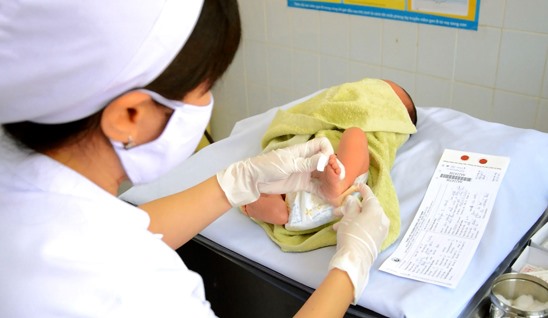 Society
Society

Huyền Trang and her family were devastated when her first child died unexpectedly and without obvious cause at only two months old.
 |
| More than 7,000 rare diseases of different kinds are reported around the world, with more than 300 million patients.— Photo suckhoedoisong.vn |
HÀ NỘI — Huyền Trang and her family were devastated when her first child died unexpectedly and without obvious cause at only two months old.
And then Nguyễn Lâm, her second child, was discovered to suffer from Pompe disease when he was five months old.
Pompe disease is an inherited disorder caused by the buildup of the sugar glycogen in the body.
When hospitalised at the National Paediatrics Hospital, Lâm’s heart functions decreased and he faced high risk of heart failure.
Taking pity on Lâm, Trang’s father-in-law wanted to give his heart up to save the little boy.
But, Trang said, Lâm’s disease is a rare metabolic disorder that only five out of 10,000 people around the world suffer from. Treatment for it is very difficult and costly, about VNĐ1.5 billion (US$65,200) per year.
Trang shared her story at the Việt Nam - North American Medical Genetics Conference, which was held on Monday and Tuesday in Hà Nội. The boy is still undergoing treatment.
The conference attracted experts on genetics in Việt Nam and North America and focused on updating new genotypic applications in clinical practice, screening, prenatal diagnosis, neonatal screening, genetic counseling in the world and in Việt Nam.
According to Professor Lê Thanh Hải, director of the National Paediatrics Hospital, more than 7,000 rare diseases of different kinds are reported around the world, with more than 300 million patients. As many as 90 per cent of them lack treatment measures and proper medicine.
A total of 80 per cent of rare diseases are hereditary.
“Besides causing fatalities in children, genetic diseases also make up a high rate of the reasons that force patients to stay at hospital for treatment,” said Hải.
Hải added the number of fatalities due to birth defects in under-five-year-old children in Việt Nam in 2015 was 16 per cent, the second leading cause of death after being born prematurely.
"With the achievements of biochemistry and molecular biology, medical genetics has helped people understand most of pathologies. It is also the scientific basis for developing new treatments," he said.
After a visit to the National Hospital of Paediatrics, Professor Rodney Howell, president of the International Association for Neonatal Screening and other experts, scientists, medical genetics experts from the US and Canada supported the hospital in training, diagnosis and genetic counseling.
To continue to assist families of children with rare diseases and to help discover the diseases early, a Centre for Neonatal Screening and Management of Rare Diseases was established at the National Hospital for Paediatrics at the beginning of this year.
The hospital also implemented newborn screening of 55 diseases from December 2017 to detect treatable diseases and limit deaths due to rare diseases. — VNS




